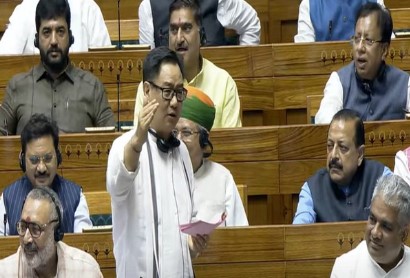Union Minority Affairs Minister Kiren Rijiju brought attention to the Parliament regarding the contentious issue of Tiruchendurai village in Trichy district, where a predominantly Hindu village was controversially declared as Waqf property by the Waqf Board. Rijiju highlighted the need for a permanent resolution, stating that villagers have been temporarily registering deeds through negotiations since 2022.
Located on the banks of the Cauvery River, Tiruchendurai villagers were shocked to learn that the Tamil Nadu Waqf Board claimed ownership of their ancestral lands, including the over 1,000-year-old Tiruchendurai Chandrasekhara Swamy Temple. The issue surfaced when a local attempted to sell his agricultural land and was informed that his 1.2-acre plot was under Waqf Board ownership, requiring a No Objection Certificate (NOC) from the board for the sale.
In 2022, a preliminary inquiry by revenue officials and a subsequent peace meeting, involving Waqf Board representatives, led to a temporary agreement allowing title deed registration until further orders.
Local residents, like V Chandrasekharan, expressed their disbelief, stating that their families have lived in the village for generations without any Muslim presence or prior claims by the Waqf Board. Another villager, Dr Raja, voiced concerns about the sudden ownership claims by the Waqf Board, despite the village’s long-standing Hindu heritage and ancient temple.
Rijiju raised the issue during the introduction of the Waqf (Amendment) Bill, 2024, which aims to address powers of State Waqf Boards, registration, and encroachment issues. The bill’s introduction faced strong opposition from parties including Congress, DMK, NCP, Trinamool Congress, and AIMIM, who argued that its provisions were against federalism and constitutional principles, demanding either its withdrawal or referral to a standing committee.

















